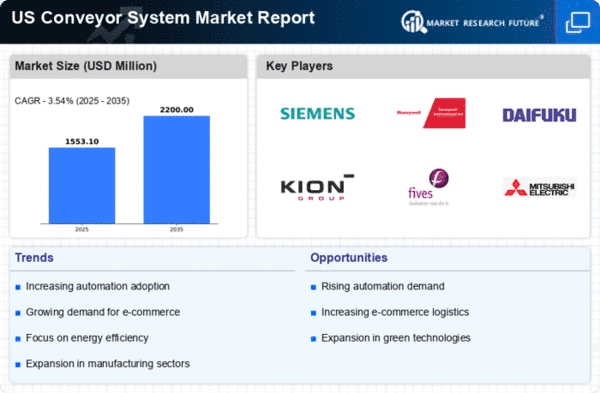Increased Automation in Manufacturing
The conveyor system market is experiencing a notable surge due to the increased automation in manufacturing processes across various sectors. As industries strive for enhanced efficiency and productivity, the adoption of automated conveyor systems has become paramount. In 2025, it is estimated that the automation market in the US will reach approximately $200 billion, with a significant portion allocated to conveyor systems. This trend indicates a shift towards more streamlined operations, reducing labor costs and minimizing human error. The integration of advanced technologies, such as robotics and AI, further propels the demand for sophisticated conveyor systems. Consequently, manufacturers are investing heavily in these systems to maintain competitiveness, thereby driving growth in the conveyor system market. This trend is likely to continue as companies seek to optimize their supply chains and improve overall operational efficiency.
Expansion of the Food and Beverage Industry
The conveyor system market is growing due to the expansion of the food and beverage industry, which relies on efficient production and distribution. As consumer demand for processed and packaged foods continues to rise, manufacturers are investing in advanced conveyor systems to streamline their operations. In 2025, the US food and beverage market is projected to reach approximately $1 trillion, driving the need for effective material handling solutions. Conveyor systems are essential for automating the movement of products through various stages of production, packaging, and distribution. This trend indicates a growing reliance on conveyor technology to enhance efficiency and maintain product quality. Consequently, the conveyor system market is likely to thrive as food and beverage companies seek to improve their operational capabilities and meet the increasing demands of consumers.
E-commerce Growth and Logistics Optimization
The rapid growth of e-commerce is significantly impacting the conveyor system market, particularly in the logistics and warehousing sectors. As online shopping continues to gain traction, companies are increasingly investing in conveyor systems to enhance their distribution capabilities. In 2025, the US e-commerce market is projected to surpass $1 trillion, necessitating efficient logistics solutions. Conveyor systems play a crucial role in automating the sorting and handling of goods, thereby improving order fulfillment times. This demand for speed and efficiency in logistics operations is driving the adoption of advanced conveyor technologies. Furthermore, the need for scalable solutions to accommodate fluctuating order volumes is pushing businesses to integrate more sophisticated conveyor systems into their operations. As a result, the conveyor system market is poised for substantial growth, fueled by the ongoing expansion of the e-commerce sector.
Rising Demand for Material Handling Solutions
The conveyor system market is witnessing robust demand for material handling solutions, driven by the need for efficiency across various industries. As businesses seek to optimize their supply chains, the reliance on conveyor systems for material handling has become increasingly evident. In 2025, the material handling equipment market in the US is expected to reach approximately $40 billion, with conveyor systems constituting a significant share. This growth is attributed to the rising need for automation in warehouses and manufacturing facilities, where conveyor systems facilitate the seamless movement of products. Additionally, the increasing complexity of supply chains necessitates the implementation of reliable and efficient material handling solutions. Consequently, the conveyor system market is likely to expand as companies prioritize the integration of advanced systems to enhance operational efficiency and reduce costs.
Technological Advancements in Conveyor Systems
Technological advancements are playing a pivotal role in shaping the conveyor system market, as innovations continue to enhance system capabilities and performance. The introduction of smart conveyor systems, equipped with IoT and AI technologies, is revolutionizing the way goods are transported and managed. In 2025, the market for smart conveyor systems is projected to grow significantly, driven by the need for real-time monitoring and data analytics. These advancements enable businesses to optimize their operations, reduce downtime, and improve overall efficiency. Moreover, the integration of energy-efficient technologies is becoming increasingly important, as companies aim to reduce their carbon footprint. As a result, the conveyor system market is likely to benefit from these technological innovations, which not only enhance productivity but also align with sustainability goals.

















